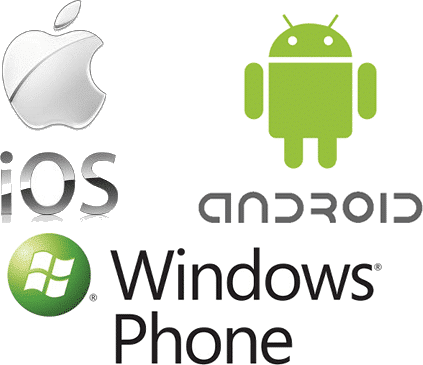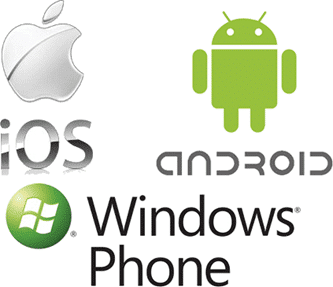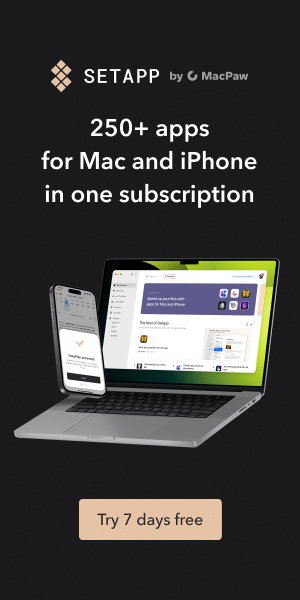Everything is going smart these days. We have smart TVs, smart cars and the most obvious one, smart phones. What really is the meaning of “smart?” Are these items actually “intelligent” or do you have to be “smart” to use them? I would say it is a mixture of the two. “Smart” phones are probably the most intriguing of the cell phones that are out there. They have leap frogged the “feature” phone in terms of popularity – a feature phone is what I consider a “dumb” phone where the functionality of the device is pretty much just to make/receive calls and texts. There are probably a few more features that make them as good “starter” phones. However, because the price of smart phones has dropped so much recently, you might want to spend a little bit more and get a phone with brains.
How do you choose the right smartphone though, now that you have made the decision to get one? What do you look for? What are the most important advantages or disadvantages of a particular platform (think Apple’s iOS , Google’s Android and Microsoft’s Windows Phone 7)? Do note that there are other platforms available, but these 3 are probably the ones that 1) I’m most familiar with and 2) are the most popular.
Choosing the right platform is the first part of your “smart” decision. First, you need to do a bit of introspection to understand what you can handle. Here are some to get you down that decision-tree path:
- Do you like to tinker with things and have more control over your environment? (Try Android)
- Do you want things to simply work with little or no customization? (Try Apple iOS)
- Do you want tight integration with other Windows devices? (Try Windows Phone 7)
Another way that I have described the mobile space, especially the applications that make up a mobile operating system, is that of being a type of park, where iOS is a “walled garden,” Android is the “civic park” and the mobile web in general is like an “open field.” I view Windows Phone 7 as falling in between the walled garden and the civic park, so perhaps a “suburban playground” might work for that platform. The idea here is around how applications work within the respective marketplaces of these mobile platforms.
The walled garden (iOS) provides you with a clean, safe and comfortable environment. Apple supposedly fully tests out all of the applications that are submitted to its App store to ensure that they don’t have any malware. It’s a controlled process that some say has too much control, thus stifling some innovation. But with this control also comes a sense of quality and security. But, this marketplace is where most new applications or games arrive first. It’s also easy to share applications between multiple family members if you use the same iTunes user account for all of your app purchases. That way, you buy once, and install on multiple devices.
The suburban playground (Windows Phone 7) is pretty similar to the walled garden in that you have a tightly controlled operating system, lots of eye candy, and a relatively pleasing experience. Windows Phone 7 brings the Microsoft ecosystem with it and a unique design style and integration of services and devices (e.g, Xbox). Its marketplace is much smaller than both Apple’s and Android’s but many of the popular apps have been ported to its platform.
The civic park (Android) offers a wider range of experiences and characters, much the same way you might see every walk of life in a park in the city. It has a growing marketplace and is giving Apple the biggest run for the money. The only (possible) issue is that there are so many Android devices out there, sometimes it is difficult to figure out which one is the best. My recommendation is to actually go into a store and test some out. If you have smaller hands, you might not want the larger screen sizes. Also, there seems to be a bit more prevalence of malware on the Android OS (but there are plenty of applications that can monitor your safety and security of your privacy).
Lastly, in terms of marketplaces, there is the very generic open field which is full of regular websites, mobile-optimized websites and even HTML 5 mobile “apps” which all provide you with plenty of content (and possibly dangers as well). It’s unfettered and unrestricted…the pure Internet as we know it. But the nice thing is you can get to it from any device, regardless of operating system.
So, my advice to you when shopping for a smartphone is be “smart” in your research process. Go to stores and test out the form-factors of the plethora of smartphones out there. Then, test out the operating systems. Do they make sense? Do you need something easy or want to be able to dive into the underlying complexity? Lastly, ask your friends, family and coworkers what they think the advantages or disadvantages are of their smartphones. The great thing is, with so many options out there, you can really find something that works best with your lifestyle!
HTD says: Smartphones aren’t that smart, nor do you have to be to use one.




